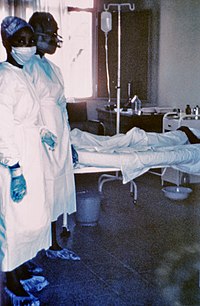
Photo from wikipedia
To better understand the association between Ebola-related attitudes and interest in receiving an Ebola virus vaccine, a survey was administered to a U.S. national sample using GfK's KnowledgePanel®. Among participants… Click to show full abstract
To better understand the association between Ebola-related attitudes and interest in receiving an Ebola virus vaccine, a survey was administered to a U.S. national sample using GfK's KnowledgePanel®. Among participants (N=1417), 34.1% expressed interest in an Ebola vaccine for themselves. In the subset of participants with children aged 0-17 (N=410), 38.1% expressed interest in an Ebola vaccine for their child. In multivariable analyses, vaccine interest for oneself was associated with perceived susceptibility to Ebola (p=0.009), beliefs that the U.S. government should spend money to control Ebola (p=0.002), and beliefs Ebola posed a national threat (p=0.007). Vaccine interest for one's child was associated with perceived severity of Ebola (p=0.018) and beliefs that the U.S. government should spend money to control Ebola (p=0.003). Findings highlight the influence of personal and national threat beliefs on vaccine interest. Understanding the impact of threat beliefs may benefit vaccine campaign development during future pandemic threats.
Journal Title: Vaccine
Year Published: 2017
Link to full text (if available)
Share on Social Media: Sign Up to like & get
recommendations!